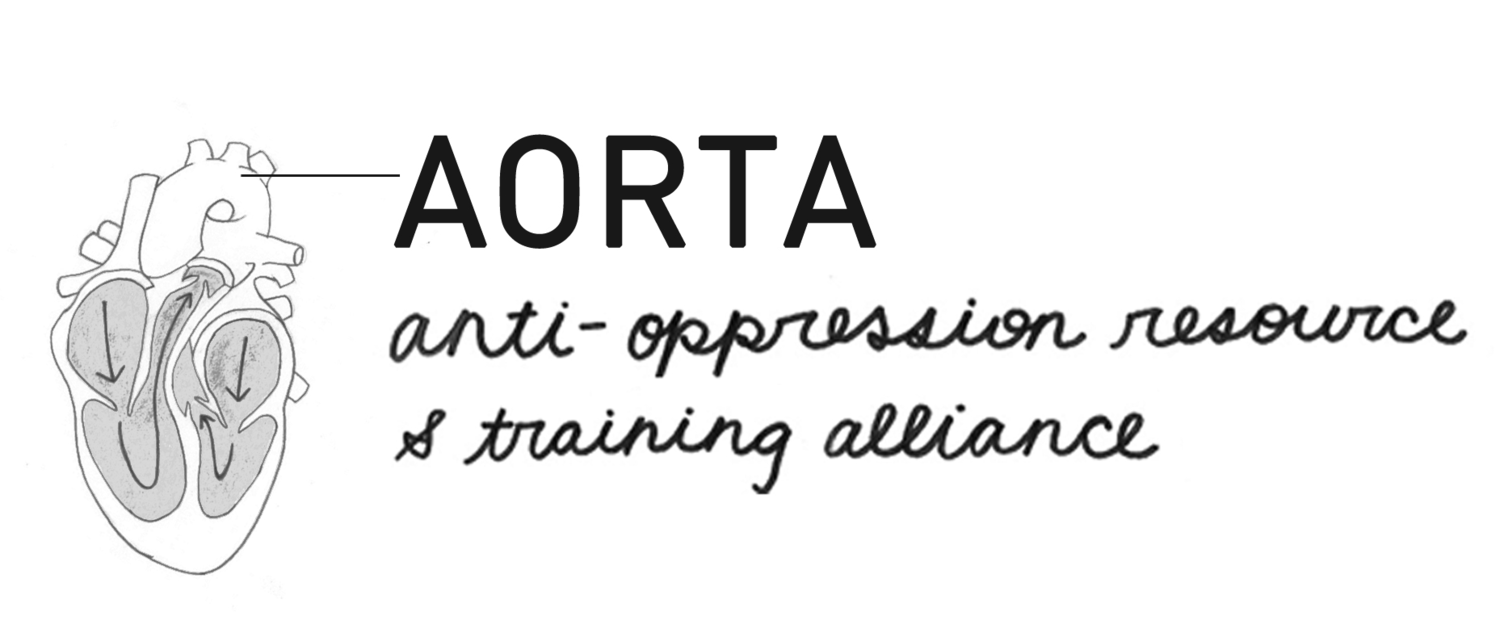AORTA’s offerings for groups
Every year, we support around 80 movement groups across the country whose purpose is rooted in racial, gender, economic, environmental, and disability justice; trans and queer liberation; anti-capitalism and anti-imperialism.
Explore this page to learn more about areas of expertise and our core methods. To learn more about our rates, visit our rates page.
Areas of expertise
Here are our 6 areas of expertise, with the most common questions that groups come to us wanting to answer.
-
What is the analysis of the problem we exist to solve?
Who are the others around us in the movement ecosystem? How do we work in concert with them towards a shared vision?
What are we uniquely positioned to do as a group?
Who are our core constituents?
What is our approach to the work, and what impact on the problem do we think it will result in?
What are our values that guide how we do our work and collaborate as a team?
-
What are the threats, opportunities, resources, and strategic contradictions that we anticipate in the next ____ years?
What are the differences or disagreements we anticipate will arise within our team in the next ___ years?
Where is the most strategic place to put our time and energy in the next year?
What areas of our work can we put on pause for the next year?
Where should we expand our capacity (e.g. hiring, learning and study)?
How should we sequence our different activities next year?
-
Is it possible to have a hierarchical shape while still cultivating democratic participation?
What shared leadership models are out there and will they work for us?
How can we have a democratic decision making structure without having everyone in every single meeting?
How do we respond to urgent needs swiftly while maintaining values of sharing power?
What conditions can create trust for some decisions to be made without everyone being involved?
How do we have clear expectations for each other without being punitive?
-
How do we balance accountability, care, and support for our workers?
How do we support worker’s sustainability when our operations capacity is lean?
How can we navigate a leadership transition with integrity?
Is our culture and structure reflecting our values of racial, economic, and gender justice?
How do we meet the needs of our constituents in a time of funding uncertainty?
What supports a thriving group culture when everyone is fatigued?
How can we shift our Humane Resources policies towards deeper alignment with our values?
-
How do we navigate this growing conflict?
What systems need to be in place to support skillful disagreement?
How can our meetings build team cohesion and culture?
Why is there so much tension on the team?
How do we supervise workers while valuing both the person and their work?
What conversations do we need to have about race, class, and gender dynamics on our team?
What’s getting in the way of us collaborating smoothly?
How do we make amends with our partners?
-
What is white supremacy and how does it show up in my organization?
How does power sharing in my organization relate to anti-oppression values?
What facilitation approaches support participatory and equitable meetings?
What are the principles of Black Feminism?
What is Principled Struggle and how can we cultivate it in my group?
What are the individual skills and mindsets that are required to support democracy in a workplace?
What are liberatory communication practices that I can incorporate into how my group communicates with each other?
How do I handle power dynamics and tension in a decision making meeting?
What we do
Here are the 6 types of support that we offer groups. We often combine these ways of working when we’re collaborating with an organization.
-
We use participatory and creative facilitation techniques to guide conversations in virtual, in person, and hybrid groups. We prioritize accessibility and engagement, and are skilled at facilitating in the midst of complex power dynamics and high levels of tension. Some examples of types of meetings we are hired to facilitate include:
Team retreats
Strategic convenings
Alliance conferences
Affinity or caucus spaces
Conflict resolution conversations
Healing spaces
Train the trainers
-
We take a group’s goals around strategy, transition, and learning, and map out a journey to meet that goal. This includes sequencing, prioritizing needs, and identifying areas of support for individuals. Along the way, we provide steady accompaniment and consistent check points to support adaptation when the terrain changes. Some examples of processes we design include:
Re-visioning an organizations’ purpose
Strategic planning
Sunsetting leadership or organizations
Partnership formation
Decision making restructuring
Conflict transformation and moving forward
Political study and learning
-
We work closely with leaders and organizers on complex challenges, providing advice and co-thinking. Some ways that we provide this include:
Standing or on-demand consultation meetings
Sharing lessons and models from our experience working with other groups
Designing resources
Writing and editing support on strategy documents
Curriculum design
-
We offer trainings and workshops for groups on both political learning and practical skills development. Some offerings include:
Facilitate for Freedom Fundamentals for Organizations: participation and power sharing
Another Workplace is Possible: Visions, Mindsets, and Practices of Democratic Groups
Anti-Oppressive Communication for groups
Liberatory Approaches to Humane Resources
-
We bring a healing-centered and resilience-focused approach to our coaching with teams and individuals. We work with all levels of workers, from young leaders to senior members, to supporting self-knowing in the context of collective struggle. We work to support each person involved in the group to both process the grief that accompanies change, and develop the mindsets and practices that are necessary to meaningfully participate in the group.
-
We offer 1 on 1 and group mediation to support repair and healing in trauma-informed ways. We believe building resilience is critical for our movements to be successful, and we lovingly push groups towards cultivating strength and alignment in conflict.
